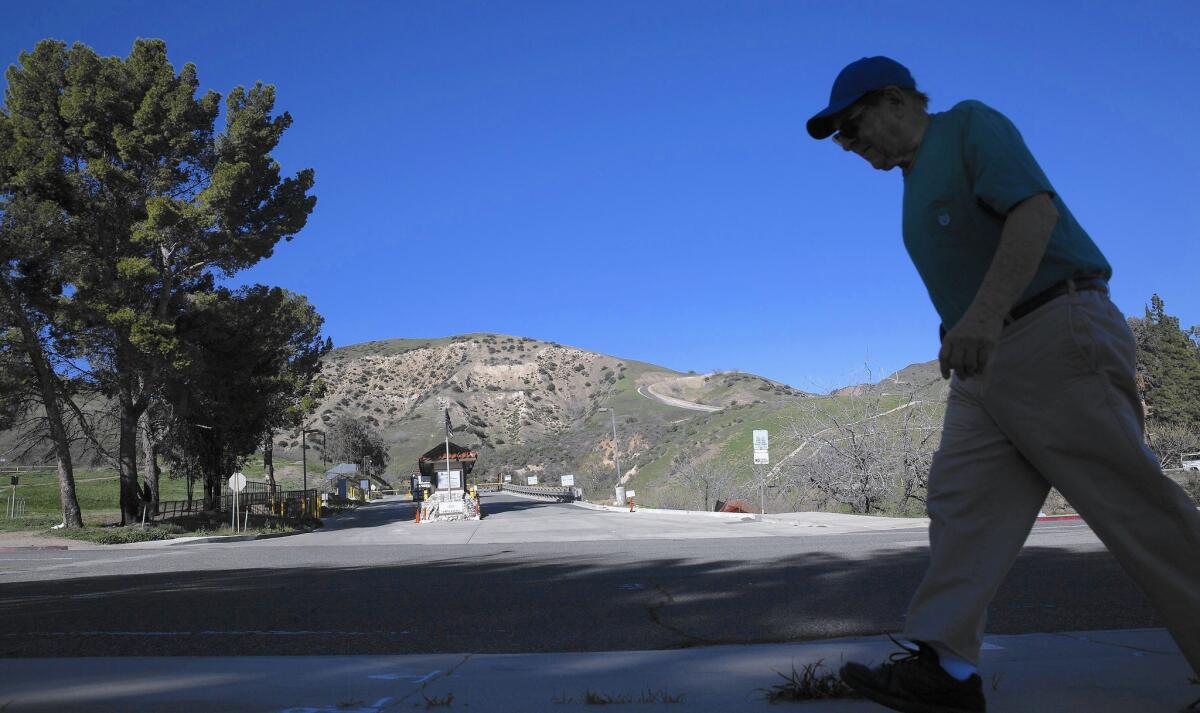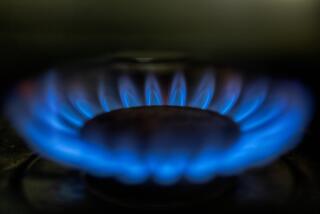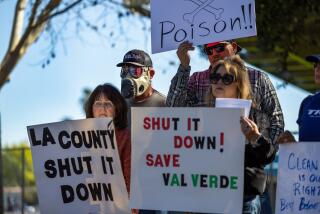Company aims to resume injecting natural gas in Aliso Canyon storage field this summer

Southern California Gas Co. says it intends to resume injecting natural gas in its shuttered Aliso Canyon storage field as soon as late summer, using a small number of high-production wells.
Under the timetable disclosed in an interview Wednesday, the company said it intended to meet state requirements for preliminary testing on all 115 wells at the storage facility. However, it intends to resume injections of high-pressure gas into some wells that will have undergone a full range of testing for risks of failure.
The strategy would allow the utility to resume operations sooner than if all wells had to be fully tested before any were placed back into production.
The field has been closed since a leak in late October sent massive amounts of gas into the atmosphere and forced thousands of nearby residents to flee their homes for months.
Southern California Gas officials said they would announce the plan to resume operations at a public hearing Friday on the effects that closure of the field is expected to have on power supplies in Los Angeles this summer. State agencies warned Tuesday that closure of the storage facility could lead to spot blackouts caused by shortages of natural gas that powers electrical generators.
The state has directed the gas company to keep the field shuttered until all wells are tested for ongoing leaks. However, wells that pass only preliminary tests can remain idle for up to a year before further testing, if required, or they are permanently plugged.
Sen. Fran Pavley (D-Agoura Hills) said state regulators told her office Wednesday that the gas company intends to finish those initial leak tests by the end of the month, including on two dozen wells now listed by the gas company as out of operation.
However, the gas company is subjecting only a portion of its wells to the extensive internal tests that would reveal corrosion, cracks and other safety risks. Those tests are required before a well can be put back in operation.
“The idea was to test them all,” Pavley said. “This plan may get us to the same endgame.”
Southern California Gas officials said in the interview Wednesday that they have identified the wells that will undergo the first full tests. Those inspections include integrity tests that require bringing in large field rigs and can take more than a month per well to complete.
The company has eight rigs on the site conducting those tests. Reports to the state show that five wells so far have undergone those tests but none have received final state clearance for operation.
“That field ain’t coming back online until I’m satisfied we’ve done all the assessments we need to do,” said Bret Lane, chief operating officer with the gas company.
An executive with the Environmental Defense Fund said he was wary of criticizing the gas company’s “soft start” approach.
“Before we can be comfortable, we want to see the well closure plans,” said Tim O’Connor, director of California oil and gas programs for the nonprofit group. “We certainly don’t want to just take the gas company’s word.”
Gov. Jerry Brown’s office continues to keep close tabs on the state’s handling of Southern California Gas.
A closed-door briefing on the energy report in Sacramento on Tuesday was led by Wade Crowfoot, a senior advisor to Brown and former regional director for the Environmental Defense Fund. Crowfoot and representatives from utility and energy commissions said they do not intend to relax testing requirements in order to put the gas field back in business, an attendee said.
Engineering experts consulted by the state said the extensive tests are crucial because they provide access to internal casings of wells that often go years without inspection.
“Given the age of the Aliso Canyon wells, the tests were what we felt were needed to fully qualify the outer barrier,” said Barry Freifeld, a mechanical engineer at Lawrence Berkeley National Laboratory who was on the team consulted by the state.
For now, the gas company said it has sidelined 24 wells similar to Standard Sesnon 25, the well that blew in October and released an estimated 100,000 metric tons of methane before it was plugged in February.
Surveys of the gas storage field have revealed what gas officials called other “minor leaks,” said Chris Gilbride, a spokesman for Southern California Gas. He said none were hazardous.
The report warning of blackouts, issued by three state energy agencies and the Los Angeles Department of Water and Power, has been greeted with skepticism by consumer advocates.
Food and Water Watch, which argues Aliso Canyon should be permanently closed, has hired a San Diego engineering firm to produce its own report on the potential effect on power generation.
“We suspect that they are exaggerating some numbers and that Aliso Canyon is more of an economic tool for SoCal Gas,” said Adam Scow, California director of Food and Water Watch.
“It’s less about actual reliability but more of an economic tool in the way that it allows them to stabilize their own gas prices and sell to some of the bigger non-core customers,” Scow said.
Seventeen power plants purchase and store natural gas in the storage field, the gas company said. The field also supplies oil refineries, but Lane said it is more difficult to reduce gas supply to those operations.
More to Read
Start your day right
Sign up for Essential California for news, features and recommendations from the L.A. Times and beyond in your inbox six days a week.
You may occasionally receive promotional content from the Los Angeles Times.








